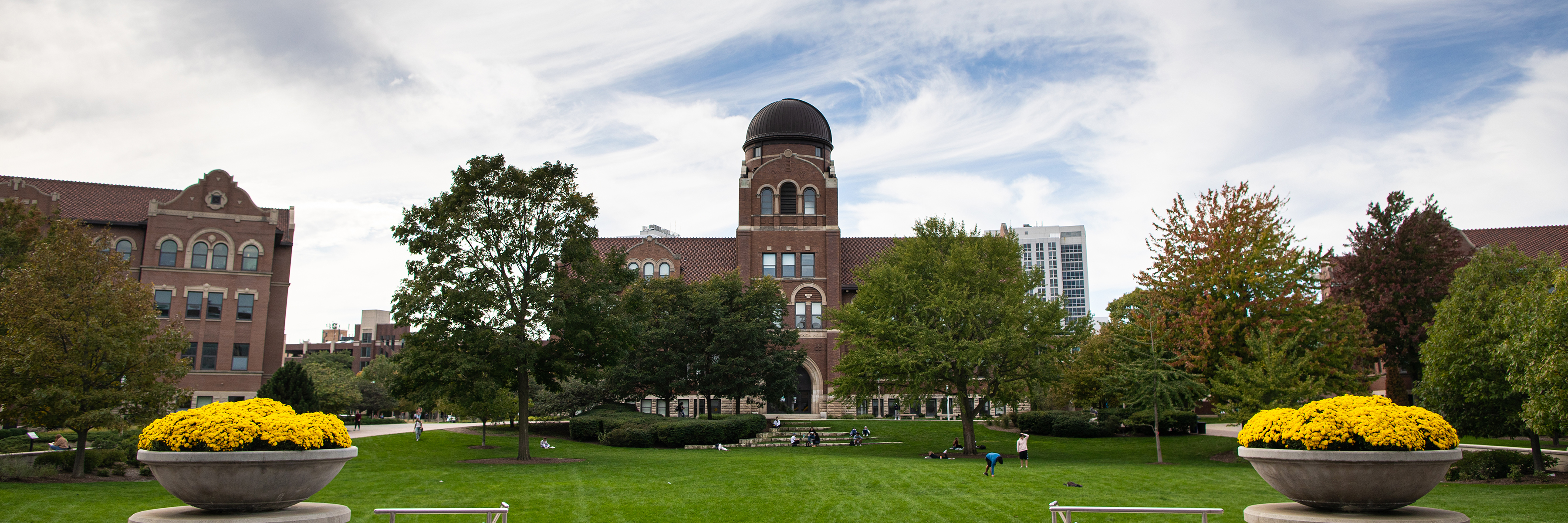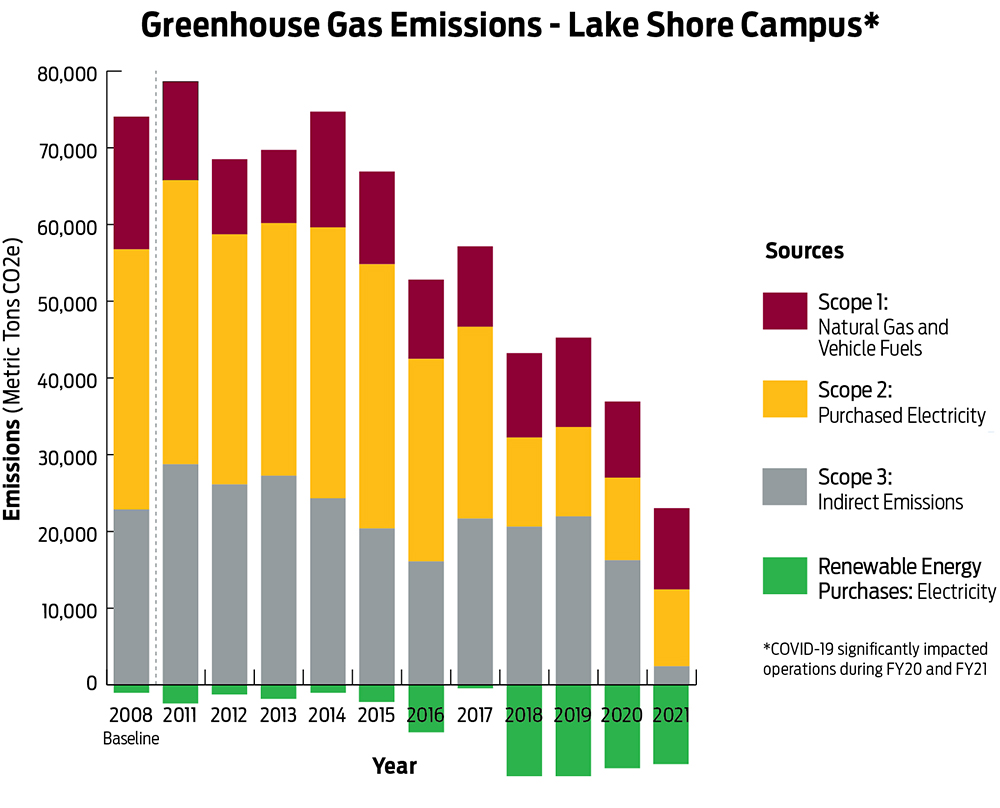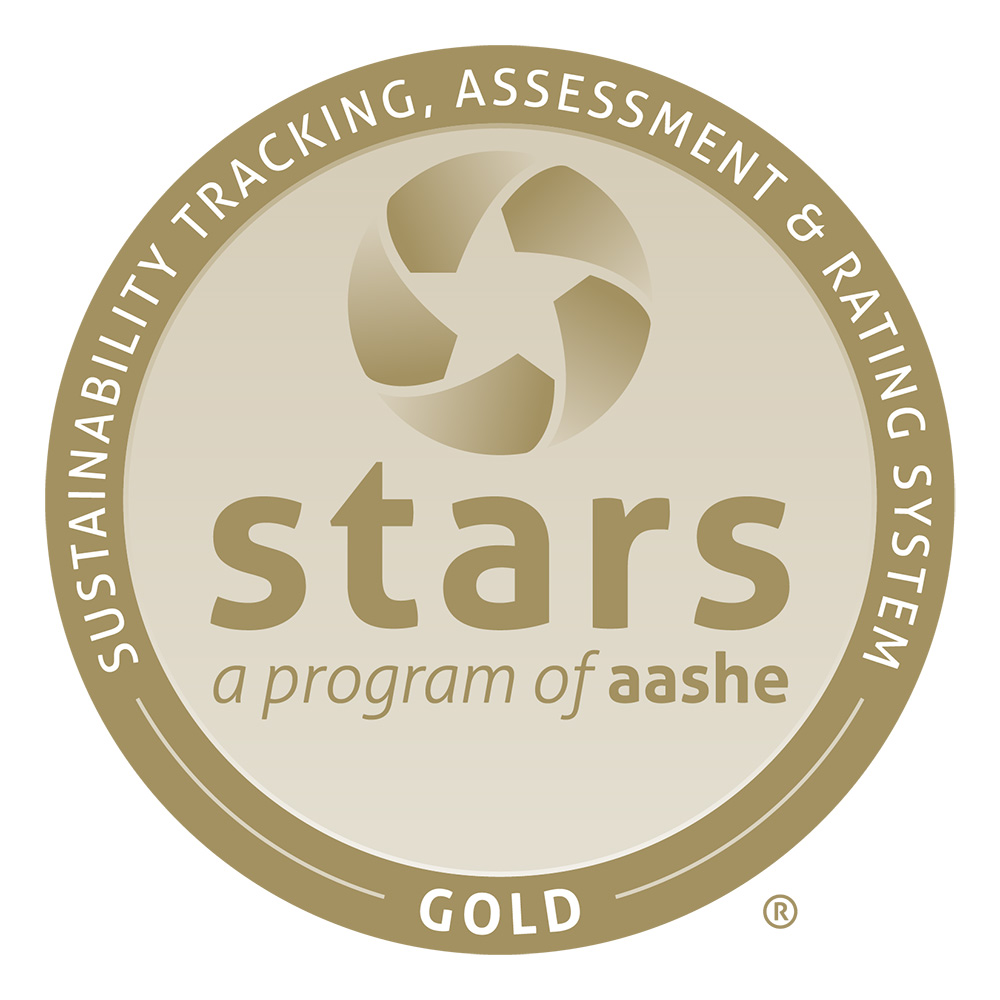Green Campus

Creating a Sustainable Campus
GREEN CAMPUS
Loyola’s strategic plan identifies Care for Our World as a core enduring value, reinforcing our university-wide commitment to sustainability. The Office of Sustainability supports efforts to put this commitment into action in our daily operations and activities.
Staff members in the Office of Sustainability coordinate the University Sustainability Committee, which includes students, faculty, staff, and administrators. The team collaborates across university campuses and departments to conserve energy, cut waste, and reduce greenhouse gas emissions. These efforts are yielding results, motivating the university community to push toward even more ambitious sustainability goals.
500
tons of material recycled annually, including paper, plastic, and metals
200
tons of organic waste diverted from landfills each year through composting
Becoming Carbon Neutral
From 2013 to 2022, undergraduate enrollment in SES more than doubled, growing from 154 to 420 students who are earning degrees in six different majors.
Loyola published its Climate Action Plan in 2015, establishing a goal of becoming carbon neutral for directly controlled greenhouse gas emissions (Scope 1 and 2) by 2025. Since then, partners across the university have worked to increase energy efficiency, procure renewable electricity, and reduce Loyola’s climate footprint.
The Office of Sustainability leads an annual greenhouse gas emissions inventory to measure progress toward this goal and identify areas of improvement and opportunities for action. Loyola is on track to meet the targets outlined in Climate Action Plan and will continue that momentum past 2025, aiming to decarbonize the campus and cut indirect, Scope 3 emissions.
Recent climate action accomplishments include:
- Loyola partnered with Elara Engineering to create Energy Master Plans for the Water Tower and Health Sciences Campuses. A team of Loyola student energy auditors supported this effort.
- An ad hoc working group of Loyola staff, faculty, and students developed Carbon Offset Purchasing Guidelines to ensure that offset purchases represent significant emissions reductions and provide education and research opportunities for students.
- The University Transportation Committee developed an Electric Vehicle Charger Strategy to accommodate a more sustainable commuter and campus fleet.

Loyola is on track to meet the emissions guidelines in the University Climate Action Plan.
Reducing Waste
Mask Recycling
During the early stages of the COVID-19 pandemic, Loyola quickly went remote. When in-person campus activities resumed in the fall of 2021, masks were necessary, and large quantities of disposable masks were going to landfills or contaminating standard recycling bins.
Recognizing this situation, Student Government Senator Hannah Yun approached the Office of Sustainability about recycling opportunities for masks and other personal protective equipment. The team added a mask collection bin to Loyola’s Cycle and Recycle Center, and at the end of the spring semester, they shipped a large box packed with masks to TerraCycle for recycling.
In the fall of 2022, the program will continue at the Lake Shore Campus and expand to the Health Sciences Campus through a partnership with Campus Ministry. This initiative will reduce waste as we continue to use masks as a tool for campus health.
Compost at Water Tower Campus
Since 2012, Loyola has collected and composted food scraps and other organic material from dining halls, special events, and landscaping at the Lake Shore Campus. Individuals on the campus also help reduce waste through our Compost Bucket Program. These activities divert over 200 tons of organic waste from landfills every year.
In 2022, Loyola brought composting to the Water Tower Campus, launching a pilot program at the Arrupe College Wintrust Student Commons. By expanding composting to additional dining locations and campuses, Loyola can reduce its impact on landfills and play a vital part in developing healthy soil.
Commitments and Policies
Laudato ‘Si
In fall of 2021, Loyola committed to Pope Francis’ Laudato Si’ Goals. This will continue to expand faculty, staff, and student involvement in justice-oriented sustainability at Loyola.
Sustainable Investment Policy
In the fall 2021 semester, Loyola adopted a Sustainable Investment Policy that outlines a strategy to divest from fossil fuels and direct investment to funds and companies that reduce greenhouse gas emissions and seek solutions to climate change. This policy will maximize the positive climate impact of the university’s endowment.
Land Acknowledgement Statement
In 2021 Loyola approved a Land Acknowledgement Statement recognizing Indigenous People as immemorial stewards of the land on which its campuses are located and paying respect to the enduring relationship between Indigenous Peoples and their traditional lands.
Awards

STARS Gold

STARS Gold

Tree Campus USA
Becoming Carbon Neutral
From 2013 to 2022, undergraduate enrollment in SES more than doubled, growing from 154 to 420 students who are earning degrees in six different majors.
Loyola published its Climate Action Plan in 2015, establishing a goal of becoming carbon neutral for directly controlled greenhouse gas emissions (Scope 1 and 2) by 2025. Since then, partners across the university have worked to increase energy efficiency, procure renewable electricity, and reduce Loyola’s climate footprint.
The Office of Sustainability leads an annual greenhouse gas emissions inventory to measure progress toward this goal and identify areas of improvement and opportunities for action. Loyola is on track to meet the targets outlined in Climate Action Plan and will continue that momentum past 2025, aiming to decarbonize the campus and cut indirect, Scope 3 emissions.
Recent climate action accomplishments include:
- Loyola partnered with Elara Engineering to create Energy Master Plans for the Water Tower and Health Sciences Campuses. A team of Loyola student energy auditors supported this effort.
- An ad hoc working group of Loyola staff, faculty, and students developed Carbon Offset Purchasing Guidelines to ensure that offset purchases represent significant emissions reductions and provide education and research opportunities for students.
- The University Transportation Committee developed an Electric Vehicle Charger Strategy to accommodate a more sustainable commuter and campus fleet.
Reducing Waste
Mask Recycling
During the early stages of the COVID-19 pandemic, Loyola quickly went remote. When in-person campus activities resumed in the fall of 2021, masks were necessary, and large quantities of disposable masks were going to landfills or contaminating standard recycling bins.
Recognizing this situation, Student Government Senator Hannah Yun approached the Office of Sustainability about recycling opportunities for masks and other personal protective equipment. The team added a mask collection bin to Loyola’s Cycle and Recycle Center, and at the end of the spring semester, they shipped a large box packed with masks to TerraCycle for recycling.
In the fall of 2022, the program will continue at the Lake Shore Campus and expand to the Health Sciences Campus through a partnership with Campus Ministry. This initiative will reduce waste as we continue to use masks as a tool for campus health.
Compost at Water Tower Campus
Since 2012, Loyola has collected and composted food scraps and other organic material from dining halls, special events, and landscaping at the Lake Shore Campus. Individuals on the campus also help reduce waste through our Compost Bucket Program. These activities divert over 200 tons of organic waste from landfills every year.
In 2022, Loyola brought composting to the Water Tower Campus, launching a pilot program at the Arrupe College Wintrust Student Commons. By expanding composting to additional dining locations and campuses, Loyola can reduce its impact on landfills and play a vital part in developing healthy soil.
Commitments and Policies
Laudato ‘Si
In fall of 2021, Loyola committed to Pope Francis’ Laudato Si’ Goals. This will continue to expand faculty, staff, and student involvement in justice-oriented sustainability at Loyola.
Sustainable Investment Policy
In the fall 2021 semester, Loyola adopted a Sustainable Investment Policy that outlines a strategy to divest from fossil fuels and direct investment to funds and companies that reduce greenhouse gas emissions and seek solutions to climate change. This policy will maximize the positive climate impact of the university’s endowment.
Land Acknowledgement Statement
In 2021 Loyola approved a Land Acknowledgement Statement recognizing Indigenous People as immemorial stewards of the land on which its campuses are located and paying respect to the enduring relationship between Indigenous Peoples and their traditional lands.
